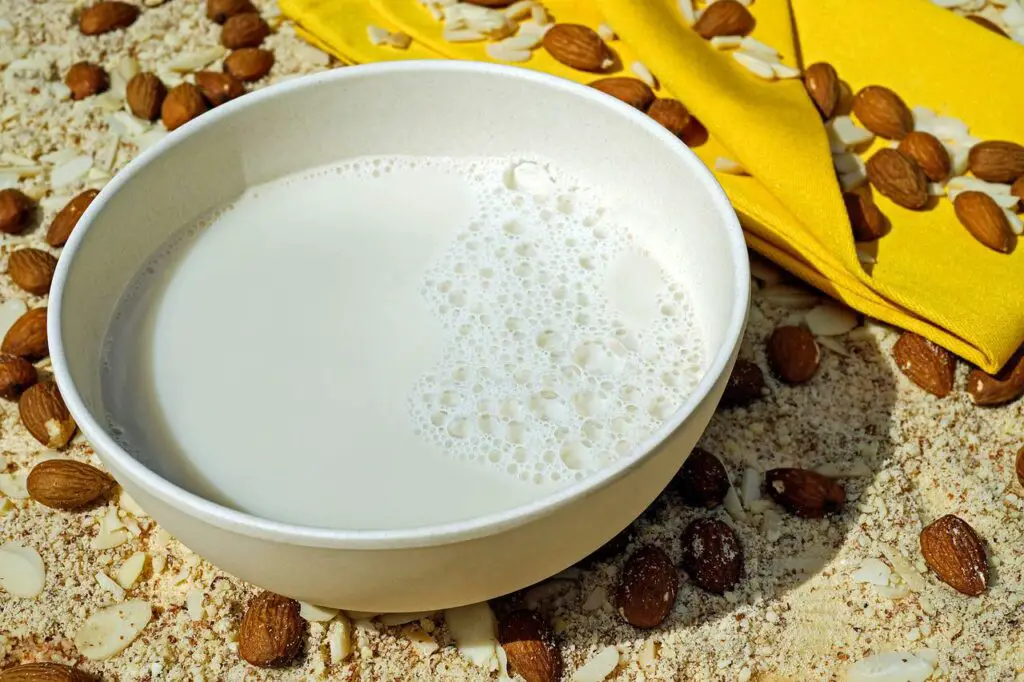Your dog has lapped up some spilled vanilla almond milk before you could wipe it down.
You are slightly relieved it’s not cow’s milk as your canine is lactose intolerant but then wonder if this flavored nut milk will cause health problems for your furry friend.
So, can dogs have vanilla almond milk?
No.
The vanilla in the almond milk contains surprisingly high levels of alcohol, which are harmful to your furry friend.
The vanilla may also contain xylitol, a sweetener that is toxic to canines.
Standard vanilla and xylitol poisoning symptoms are vomiting, diarrhea, lethargy, and seizures.
Before settling on vanilla almond milk for your dog, let’s look at the dangers of ingestion, what to do in case of poisoning, and safer alternatives.

Risks of giving vanilla almond milk to your dog
Many foods that humans enjoy are not friendly to your fur buddy.
Dogs react differently to some components in our meals, leading to adverse, even fatal results.
A good example is sweetened almond milk which is increasingly becoming popular in many homes, especially for the lactose intolerant.
Vanilla almond milk is dangerous for dogs due to two toxins: vanilla and xylitol.
Other harmful elements in the nut milk are thickeners, high sugar levels, and preservatives.
All these additives are meant to improve texture, taste, and shelf life.
Vanilla
Your dog is at a high risk of alcohol poisoning if he drinks copious amounts of vanilla almond milk.
Even in small doses, the alcohol level in vanilla extract is enough to cause harm.
Alcohol takes effect 30 minutes to an hour after ingestion, meaning you will immediately see the impact.
The severity of the poisoning depends on the dog’s age, size, health status, and amount ingested.
Symptoms to look out for in order of severity include:
- Vomiting
- Diarrhea
- Lethargy
- Confusion
- Dehydration
- Low heart rate
- Seizures
- Death
Xylitol
Xylitol is a sweetener in some food products and may be present in vanilla almond milk.
Always check the ingredients in store-bought products intended for your furry buddy to remove the chances of poisoning. Symptoms to look out for are:
- Vomiting
- Diarrhea
- Lack of coordination
- Confusion
- Weakness
- Decreased activities
- Staggering
- Collapse
- Seizures
- Low blood sugar
Thickeners
Vanilla almond milk contains thickeners like xanthan gum and carrageenan that make the milk thick and creamy.
Thickeners also prevent the milk components from separating.
Xanthan gum is not toxic to dogs unless when taken in large quantities.
Studies have indicated that carrageenan doesn’t metabolize in the body, causing digestive problems like:
- Diarrhea
- Ulcers
- Intestinal lesions
- Malignant tumors
Excessive sugar
The additional sugars are not suitable for your dog.
Too much sugar can lead to obesity and diabetes. Sugar also causes dental problems in your dog.
Other additives
Added flavors like chocolate and salted caramel added to almond milk make it toxic to dogs.
Caramel has lots of sugar which can harm your dog’s health and cause dental issues.
On the other hand, chocolate contains theobromine, a component that dogs can’t metabolize, leading to health issues like vomiting, increased heart rate, seizures, and heart failure.

What to do if your dog has ingested a lot of vanilla almond milk
In case of poisoning or toxicity from any of the abovementioned components, here’s what you can do:
- Identify the symptoms exhibited and note them down.
- Jot down the amount of milk ingested and if the packaging is available, take it with you to the veterinarian.
- Note the time since ingestion, weight, and age of your canine, as this information could be crucial in saving your pet’s life.
- Contact your vet and rush your furry friend to a hospital for medical intervention.
- Provide your pet’s doctor with all the information gathered.
Depending on the toxin ingested, your vet can either:
- Induce vomiting or bowel movement to reduce the number of toxins that enter the bloodstream.
- Use activated charcoal, which absorbs the toxins preventing them from entering the bloodstream.
- Your furry friend may also receive medication and intravenous fluids to balance the metabolism and help reverse the effects of the poisoning.
Can my dog have plain almond milk?
Yes.
You can feed your furry friend plain and unsweetened almond milk in moderation.
Almond milk is a better option for canines that are lactose intolerant.
It is a great low-calorie and low-sugar treat for your pet.
Here are some guidelines:
- Avoid flavored milk with additives as they are toxic to your canine.
- When introducing almond milk to your dog, start with a small dose to ascertain whether there is any allergic reaction.
- Almond milk shouldn’t substitute your dog’s regular water intake.
How to make almond milk
Consider making it yourself to ensure that your precious fur buddy only has the safest almond milk.
Requirement
- One cup of almonds
- Two cups of water (This gives a richness of two percent milk. Add more water for thinner milk or less water for a thicker consistency)
- Cheesecloth or fine-meshed strainer
Instructions
- Soak the almonds in an inch of water overnight or for up to two days. The longer you soak, the creamier it gets.
- Drain the soaking water and wash the almonds to remove phytic acid.
- Put the almonds in a blender and add the two cups of water.
- Blend continuously for two minutes at a high-speed setting.
- Use a cheesecloth to squeeze the mixture, extracting the milk.
- You will get two cups of almond milk.
Storage
Store the leftover milk in sealed bottles for up to two days.
Health benefits of plain almond milk
Low calorie: Plain almond milk has low calories, which is excellent for dogs since they do not need much.
Dogs require about 25 calories per pound of weight.
Low sugar: Unsweetened almond milk has zero grams of sugar, making it ideal for dogs.
Contains minerals and nutrients: The milk is rich in vitamin A, E, and D. It’s also an excellent source of iron, calcium, and potassium, all of which work towards boosting your furry friend’s health.
Lactose-free: Most dogs are lactose intolerant, making plain almond milk a great alternative.
Before introducing almond milk to your canine, try with a small sample to ensure there will be no allergic reactions.
Conclusion
Your furry friend will enjoy the benefits of plain unsweetened almond milk.
Homemade is the best option as you are in control of the ingredients.
If you opt to buy, always check the ingredients to ensure that harmful elements like xylitol are not present.
- What Dog Breeds Have Pink Skin? - March 24, 2023
- What Are the Most Inspiring Dog Breeding Quotes? - March 20, 2023
- Can Pheromone Spray Help Improve Dog Breeding Results? - March 19, 2023








